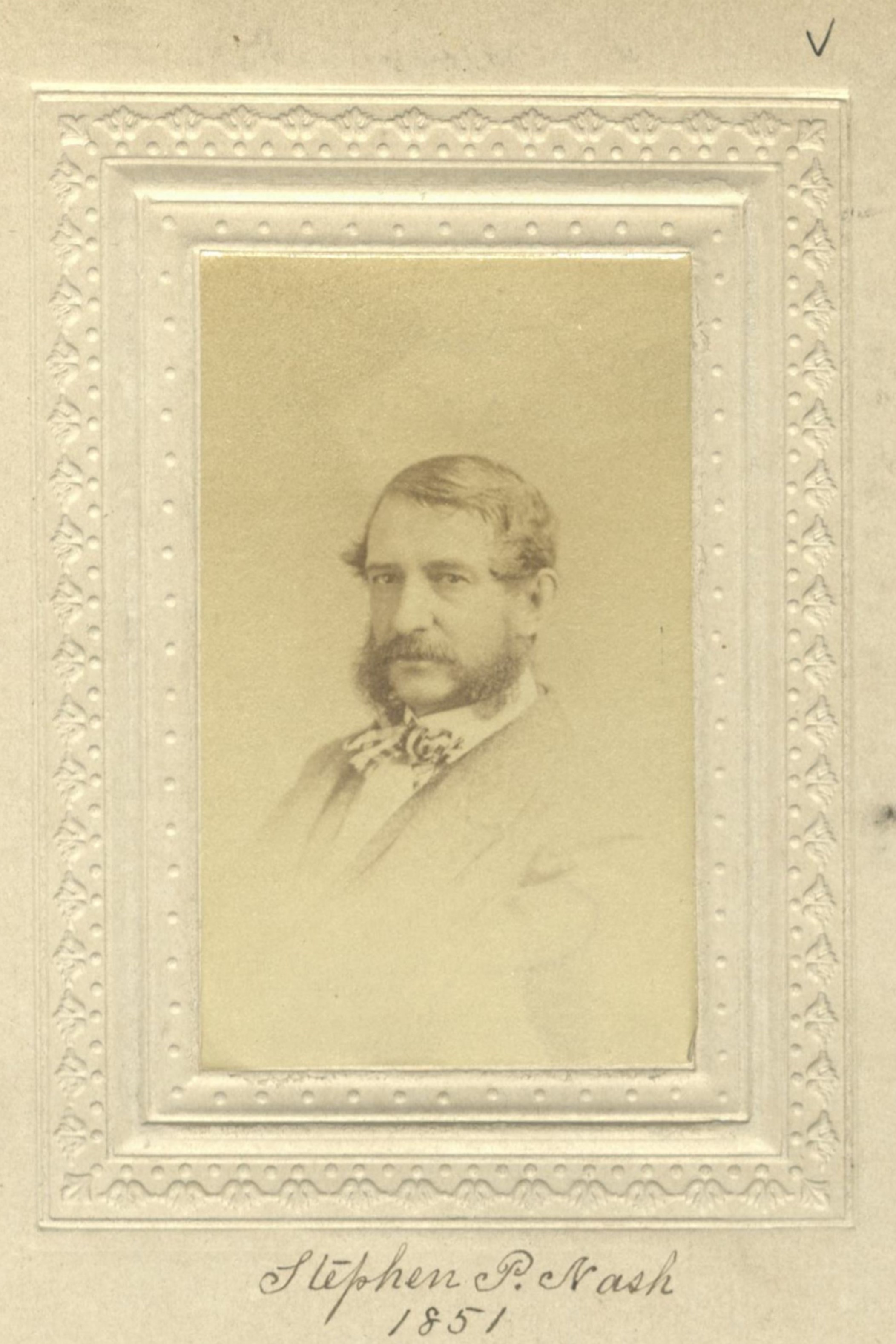Lawyer
Centurion, 1851–1898
Born 26 August 1821 in Albany, New York
Died 4 June 1898 in Bernardville, New Jersey
Buried Woodlawn Cemetery , Bronx, New York
, Bronx, New York
Proposed by Francis F. Marbury
Elected 1 February 1851 at age twenty-nine
Archivist’s Note: Father of John McL. Nash and Thomas Nash
Proposer of:
Seconder of:
- Samuel Blatchford
- Richard H. Bowne
- Silas B. Brownell
- Ralph L. Brydges
- George Prentiss Butler
- Charles Coolidge Haight
- John J. Latting
- John McL. Nash
- Robert J. Nevin
- Van Horne Norrie
- Gouverneur M. Ogden
- Cortlandt Parker
- Charles A. Peabody
- Edward S. Rapallo
- Augustus F. Smith
- Gouverneur M. Smith
- Gilbert M. Speir Jr.
- Theron G. Strong
- John Elliot Ward
Century Memorial
In this list we recognize the name of one of our most prominent members, and one of the oldest in the Club’s membership, that fine representative of the old-time lawyer and Christian gentleman, Stephen P. Nash.
For nearly fifty years he has wielded a potent influence here, not only by his wise and conservative counsel, but also by the power and charm of his personality, which made him a leader in all his undertakings, especially in the profession which he adorned. His early experience and training in association with such leaders of the Bar of this State as Esek Cowen, Nicholas Hill and Augustus Bockes, fitted him for the high position which he immediately assumed and maintained to the end of his life by the universal concurrence of bench and bar as a sound, conservative and able lawyer, distinguished in chancery practice and unsurpassed as an authority in ecclesiastical law. He was prominent in many of the most important cases to be found in our reports, and the success by which a professional career is judged came to him in ample measure.
His range of activity was wide. Notwithstanding the engrossing duties of his profession, he was an active, public-spirited citizen, earnest in charitable work, a close student, a well-read theologian, and of laymen the most prominent figure in the Church. He was one of the founders of the Bar Association, a trustee of Columbia University and one of its most valuable advisers. As deputy to the General Convention, to the Convention of the Diocese of New York, member of numerous Joint Conventions, of the Standing Committee of the Diocese, trustee of the General Theological Seminary and also of the Cathedral of Saint John the Divine, and many other institutions, vestryman and churchwarden, clerk and counsel to the Corporation of Trinity Church, he gave to the complicated and varied work incident to these positions his invaluable counsel and unstinted personal service.
His piety was quiet, old-fashioned, simple and sincere, and while in full sympathy with the modern progress of the Church, he mistrusted and was on guard against innovations that, in his conservative mind, would lower its standard and weaken its influence. All of us who knew him would agree that the motive he ever acknowledged to himself the highest, and sought to obey, was that of duty Christianly conceived, that his character and life stood firm, based on the foundation of moral integrity. In addition to the strength of this foundation there was in him a charm of manner, a buoyancy of spirit, a gentle courtesy and a genial nature, bright, hopeful and encouraging, which endeared him to his companions and associates here and to his host of friends in the community, and causes us to treasure his memory as one of our most sacred possessions.
Henry E. Howland
1899 Century Association Yearbook

